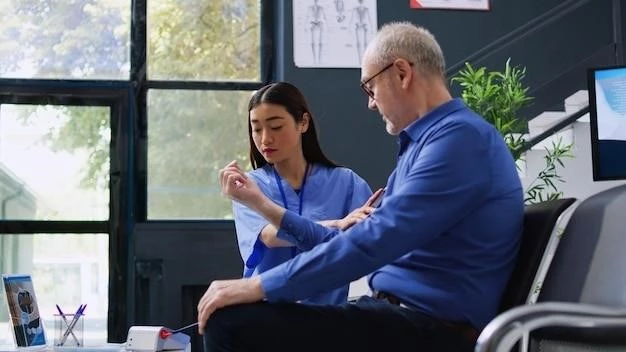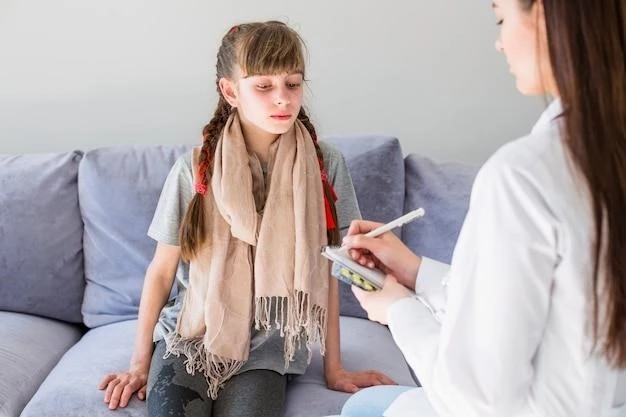Understanding Dobrow Syndrome
When it comes to Dobrow syndrome, it’s crucial to have a comprehensive understanding of this genetic disorder․ Stay informed about the symptoms, diagnosis, treatment, and prognosis․ Learn about genetic counseling, gene therapy, research, healthcare advances, specialist care, support groups, and advocacy efforts․
Introduction

Welcome to an exploration of Dobrow syndrome, a rare genetic disorder that impacts individuals worldwide․ This article aims to provide insight into the various aspects of this medical condition, including its symptoms, diagnosis, treatment options, prognosis, complications, and management strategies․ Understanding Dobrow syndrome is essential for individuals, caregivers, healthcare professionals, and researchers alike․ By delving into the complexities of this genetic disorder, we can shed light on the importance of genetic mutations, research advancements, and the critical role of healthcare in managing Dobrow syndrome effectively․ Additionally, genetic counseling, gene therapy, specialist care, support groups, and raising awareness about Dobrow syndrome are vital components of enhancing the quality of life for those affected by this condition․ Stay tuned to learn more about Dobrow syndrome and how you can play a part in advocating for better prevention, diagnosis, and treatment options for individuals living with this rare disease․
What is Dobrow Syndrome?
Dobrow syndrome is a genetic disorder characterized by a wide range of symptoms affecting multiple systems in the body․ This rare disease is caused by specific genetic mutations that result in developmental delays, intellectual disabilities, distinctive facial features, skeletal abnormalities, and organ malformations․ Individuals with Dobrow syndrome may also experience hearing loss, vision problems, heart defects, and neurological issues․ Understanding the underlying genetic mutations responsible for Dobrow syndrome is crucial for accurate diagnosis and effective management of the condition․ By raising awareness about this rare disease and its impact on individuals and families, we can help promote early detection, intervention, and support services for those affected by Dobrow syndrome․ Stay informed about the latest research, treatment options, and resources available to navigate the complexities of this genetic disorder with compassion and expertise․
Symptoms of Dobrow Syndrome
Individuals with Dobrow syndrome may present with a variety of symptoms that can vary in severity and impact on their overall well-being․ Common symptoms include developmental delays, intellectual disabilities, distinctive facial features such as a broad forehead, wide-set eyes, and a flattened nasal bridge․ Skeletal abnormalities like short stature, joint limitations, and abnormal curvature of the spine may also be observed․ Additionally, individuals with Dobrow syndrome may experience organ malformations affecting the heart, kidneys, and other vital organs․ Hearing loss, vision problems, heart defects, and neurological issues such as seizures and motor coordination difficulties can further contribute to the clinical picture of Dobrow syndrome․ Recognizing these symptoms early on and seeking medical evaluation from a specialist can help guide appropriate treatment and support strategies for individuals living with Dobrow syndrome․
Diagnosis of Dobrow Syndrome
Diagnosing Dobrow syndrome often involves a comprehensive evaluation by a healthcare provider, typically a clinical geneticist or a genetic counselor․ The diagnostic process may include a detailed medical history review, physical examination to assess for characteristic features of the syndrome, genetic testing to identify specific genetic mutations associated with Dobrow syndrome, imaging studies such as X-rays or MRIs to evaluate skeletal abnormalities, and cardiac assessments to detect heart defects․ Laboratory tests may also be performed to assess organ function and screen for associated health issues․ It is important for individuals presenting with symptoms suggestive of Dobrow syndrome to seek timely medical attention and consult with a healthcare professional experienced in diagnosing rare genetic disorders․ By obtaining an accurate diagnosis, individuals and families can access appropriate medical care, support services, and participate in ongoing research efforts to enhance our understanding of Dobrow syndrome․
Treatment and Management
The treatment and management of Dobrow syndrome focus on addressing the specific symptoms and complications associated with the condition․ A multidisciplinary approach involving healthcare professionals such as geneticists, pediatricians, cardiologists, orthopedic specialists, and developmental therapists is often recommended to provide comprehensive care for individuals with Dobrow syndrome․ Treatment strategies may include early intervention services to support developmental delays, educational programs tailored to intellectual disabilities, surgeries to address skeletal abnormalities or organ malformations, hearing aids or vision correction methods for sensory impairments, and medications to manage associated health issues like seizures or heart defects․ Regular medical follow-ups, rehabilitation therapies, and psychosocial support can also play a crucial role in optimizing the quality of life for individuals living with Dobrow syndrome․ By collaborating with a team of healthcare providers and implementing a personalized care plan, individuals with Dobrow syndrome can benefit from a holistic approach to treatment and management to address their unique needs and enhance their overall well-being․
Prognosis and Complications
The prognosis for individuals with Dobrow syndrome can vary widely depending on the severity of symptoms, the presence of associated complications, and the timely initiation of appropriate interventions․ While Dobrow syndrome is a lifelong condition that requires ongoing medical care and support, early diagnosis, comprehensive management, and access to specialized services can greatly improve outcomes and quality of life for affected individuals․ Complications associated with Dobrow syndrome may include developmental challenges, intellectual disabilities, skeletal abnormalities leading to mobility issues, cardiovascular problems such as heart defects, sensory impairments like hearing loss and vision problems, and neurological issues including seizures․ Regular monitoring, proactive treatment of medical issues, and a supportive environment that addresses the unique needs of individuals with Dobrow syndrome are essential in mitigating complications and promoting optimal health outcomes․ By staying informed, seeking expert medical care, and fostering a collaborative healthcare team, individuals and families can navigate the challenges of Dobrow syndrome with resilience and hope․
Genetic Counseling and Gene Therapy
Genetic counseling plays a vital role in Dobrow syndrome by providing individuals and families with crucial information about the genetic basis of the condition, inheritance patterns, and available testing options․ Genetic counselors can offer guidance on family planning decisions, risk assessment for relatives, and emotional support to navigate the complexities of living with a genetic disorder․ Additionally, emerging research in gene therapy holds promise for potentially addressing the underlying genetic mutations responsible for Dobrow syndrome․ Gene therapy aims to correct or replace faulty genes to improve symptoms and overall health outcomes for individuals with genetic disorders․ By staying informed about the latest advancements in genetic research, exploring genetic counseling services, and participating in gene therapy trials, individuals affected by Dobrow syndrome can actively engage in personalized care plans and contribute to scientific progress in understanding and treating this rare genetic condition․
Research and Healthcare Advances
Ongoing research efforts surrounding Dobrow syndrome are essential for advancing our understanding of this rare genetic disorder, identifying potential treatment targets, and improving healthcare outcomes for affected individuals․ Researchers are exploring genetic mutations associated with Dobrow syndrome, developing novel diagnostic tools, investigating therapeutic interventions such as gene therapy, and enhancing supportive care strategies․ Healthcare professionals are also actively engaged in collaborative networks to share knowledge, establish best practices, and ensure multidisciplinary care for individuals with Dobrow syndrome․ By supporting research initiatives, participating in clinical trials, and advocating for increased funding and awareness, you can contribute to the collective effort to enhance healthcare advances, empower individuals with Dobrow syndrome, and pave the way for innovative treatments and interventions that have the potential to transform the lives of those impacted by this complex genetic condition․
Support Groups and Specialist Care
Accessing support groups and specialist care services can greatly benefit individuals and families affected by Dobrow syndrome․ Support groups offer a valuable platform for connecting with others who understand the challenges of living with a rare genetic disorder, providing emotional support, sharing resources, and fostering a sense of community․ Specialist care from healthcare providers with expertise in genetics, pediatrics, cardiology, orthopedics, and other relevant disciplines is essential for ensuring comprehensive and tailored treatment plans for individuals with Dobrow syndrome․ These specialists can offer specialized evaluations, personalized interventions, and ongoing monitoring to address the complex needs associated with this genetic condition․ By engaging with support groups, seeking care from knowledgeable specialists, and building a strong support network, individuals living with Dobrow syndrome can access the resources and expertise needed to navigate their healthcare journey with confidence and resilience․
Conclusion and Advocacy
In conclusion, understanding Dobrow syndrome involves awareness of the genetic mutations, symptoms, diagnosis, treatment options, prognosis, and the importance of genetic counseling and gene therapy in managing this rare genetic disorder․ By staying informed, seeking specialized care, and accessing support networks, individuals and families affected by Dobrow syndrome can navigate their healthcare journey with resilience and hope․ Advocacy efforts play a crucial role in raising awareness, promoting research initiatives, and advocating for improved healthcare services for those impacted by Dobrow syndrome․ By becoming a voice for change, supporting research advancements, and fostering a compassionate and inclusive community, you can contribute to enhancing the quality of life and outcomes for individuals living with Dobrow syndrome․ Together, let us strive to create a future where individuals with rare genetic disorders like Dobrow syndrome receive the care, support, and understanding they deserve․
